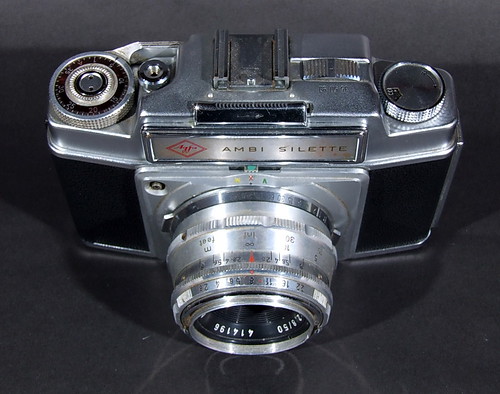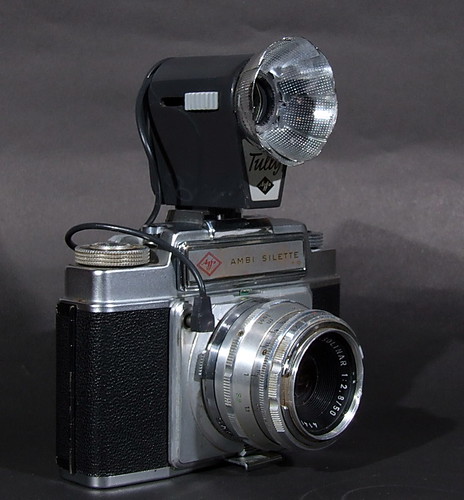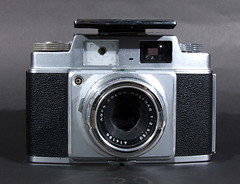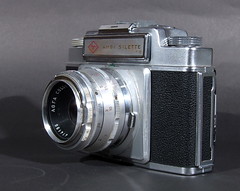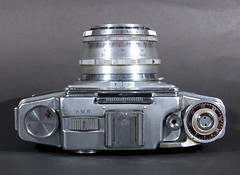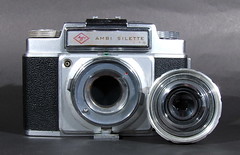Difference between revisions of "Ambi Silette"
m (link to Ansco) |
m (Specs, reorganized and clarified a few things) |
||
| Line 9: | Line 9: | ||
'''Agfa Ambi Silette''' is a interchangeable lenses [[35mm film]] [[rangefinder camera]] manufactured by [[Agfa]] Kamerawerk AG, in Munich, West Germany, and produced between 1957-1961. The Ambi Silette was the interchangeable lens member of the [[Silette]] range of Agfa cameras which included viewfinders called Silette and fixed lens rangefinders called [[Silette|Silette Super]] (Sold in the USA as [[Ansco|ANSCO]] Memar and Super Memar). The Ambi Silette was not rebranded by ANSCO. | '''Agfa Ambi Silette''' is a interchangeable lenses [[35mm film]] [[rangefinder camera]] manufactured by [[Agfa]] Kamerawerk AG, in Munich, West Germany, and produced between 1957-1961. The Ambi Silette was the interchangeable lens member of the [[Silette]] range of Agfa cameras which included viewfinders called Silette and fixed lens rangefinders called [[Silette|Silette Super]] (Sold in the USA as [[Ansco|ANSCO]] Memar and Super Memar). The Ambi Silette was not rebranded by ANSCO. | ||
| − | The Ambi-Silette had variable brightline framelines and parallax correction, which are selected manually for the 50, 35 and 90mm lenses to match the lenses available. | + | The Ambi-Silette had variable brightline framelines and parallax correction, which are selected manually for the 50, 35 and 90mm lenses to match the lenses available. For today's standards the viewfinder is relatively small, but the brightlines and the viewfinder are bright and easy to use, and the rangefinder patch is precise and bright. |
There were two types of Ambi Silette produced, with the second type appearing in 1959. The most significant change to the camera was a revised rangefinder with a 5mm wider base, probably to match the 130mm lens that was launched at the time other changes included: <ref>[https://mikeeckman.com/2019/06/agfa-ambi-silette-1957/ Mike Eckman's Notes on the Ambi-Silette]</ref><ref>[https://wesloderandnikon.blogspot.com/2019/06/the-ambi-silette-agfas-most-ambitious.html Agfa's most ambitious camera by Wes Loden]</ref> | There were two types of Ambi Silette produced, with the second type appearing in 1959. The most significant change to the camera was a revised rangefinder with a 5mm wider base, probably to match the 130mm lens that was launched at the time other changes included: <ref>[https://mikeeckman.com/2019/06/agfa-ambi-silette-1957/ Mike Eckman's Notes on the Ambi-Silette]</ref><ref>[https://wesloderandnikon.blogspot.com/2019/06/the-ambi-silette-agfas-most-ambitious.html Agfa's most ambitious camera by Wes Loden]</ref> | ||
| Line 46: | Line 46: | ||
** Recently a 35mm f/2.8 Schneider Curtagon (Agfa Typ 4401-100) was reported by Wes Loder<ref>[https://wesloderandnikon.blogspot.com/2019/05/schneider-lens-for-agfas-ambi-silette.html Schneider lenses for Agfa Ambi Silette] by Wes Loder</ref> and seems to be a prototype. | ** Recently a 35mm f/2.8 Schneider Curtagon (Agfa Typ 4401-100) was reported by Wes Loder<ref>[https://wesloderandnikon.blogspot.com/2019/05/schneider-lens-for-agfas-ambi-silette.html Schneider lenses for Agfa Ambi Silette] by Wes Loder</ref> and seems to be a prototype. | ||
*Mount: bayonet, very easy mounting, filter size 37mm slip-on or 35.5mm screw-on | *Mount: bayonet, very easy mounting, filter size 37mm slip-on or 35.5mm screw-on | ||
| − | *Lens release: press the catch on the lower front of the lens mount and simultaneously turn the lens counter clock-wise gripping the fixed milled ring on the lens | + | *Lens release: press the catch on the lower front of the lens mount and simultaneously turn the lens counter clock-wise gripping the fixed milled ring on the lens |
| − | *Focusing: matching yellow rangefinder images in the finder, | + | *View finder: coupled view/rangefinder, matching yellow images, w/ bright-line frames, parallax correction by a switch on the top plate adjusts to the 35-50-90mm lenses, the 130mm lens required a separate viewfinder |
| + | *Focusing: matching yellow rangefinder images in the finder, coupled with the distances ring on the lens, w/DOF scale; Focus range: 1-10m +inf | ||
| + | **Flip-up protecting cover on the view- and rangefinder windows on front of the camera | ||
*Shutter: Synchro-Compur leaf shutter speeds: 1-1/500 +B; Setting : ring and scale on the shutter, behind the lens, w/ two little handles | *Shutter: Synchro-Compur leaf shutter speeds: 1-1/500 +B; Setting : ring and scale on the shutter, behind the lens, w/ two little handles | ||
*Shutter release: on the right of the top plate, w/ cable release socket | *Shutter release: on the right of the top plate, w/ cable release socket | ||
| − | * | + | *Film winder: Short stroke winder, acts as cocking lever |
| − | |||
| − | |||
*Frame counter: coupled with winding lever, advance type, manual setting | *Frame counter: coupled with winding lever, advance type, manual setting | ||
| − | *Self-timer: the small green lever must point to V | + | ** Type I cameras have an additive frame counter, reset setting in 0 |
| + | ** Type II cameras have a substractive frame counter, reset setting depends on number of frames of film | ||
| + | *Self-timer: the small green lever must point to V on the dial on the top of the shutter, after exposure and winding it turns to X | ||
*Flash PC socket: on the right of the shutter, M 1/60-1/500, X 1/30 flash-synch, adjustment via the small green lever on the top of the shutter | *Flash PC socket: on the right of the shutter, M 1/60-1/500, X 1/30 flash-synch, adjustment via the small green lever on the top of the shutter | ||
*Others: Cold-shoe; Memory dial; Tripod socket 1/4 inch; Supporting slide on the front of the bottom plate | *Others: Cold-shoe; Memory dial; Tripod socket 1/4 inch; Supporting slide on the front of the bottom plate | ||
*Back cover: Hinged, opens by the latch on the left side of the camera | *Back cover: Hinged, opens by the latch on the left side of the camera | ||
| − | *Body: metal; Weight | + | *Body: metal; Weight: |
Revision as of 13:09, 15 September 2022
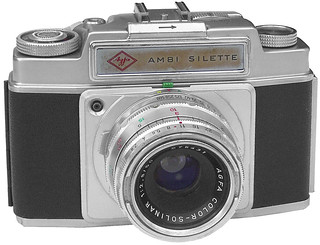
|
| Agfa Ambi Silette (1957) image by Alf Sigaro (Image rights) |
Agfa Ambi Silette is a interchangeable lenses 35mm film rangefinder camera manufactured by Agfa Kamerawerk AG, in Munich, West Germany, and produced between 1957-1961. The Ambi Silette was the interchangeable lens member of the Silette range of Agfa cameras which included viewfinders called Silette and fixed lens rangefinders called Silette Super (Sold in the USA as ANSCO Memar and Super Memar). The Ambi Silette was not rebranded by ANSCO.
The Ambi-Silette had variable brightline framelines and parallax correction, which are selected manually for the 50, 35 and 90mm lenses to match the lenses available. For today's standards the viewfinder is relatively small, but the brightlines and the viewfinder are bright and easy to use, and the rangefinder patch is precise and bright.
There were two types of Ambi Silette produced, with the second type appearing in 1959. The most significant change to the camera was a revised rangefinder with a 5mm wider base, probably to match the 130mm lens that was launched at the time other changes included: [1][2]
- Addition of strap lugs
- 35mm Frame Lines disappear when 90mm Frame Lines are selected
- Change in order of Frame Lines from 35-50-90 to 50-35-90
- Exposure counter changed from additive to subtractive order
- Cosmetic changes to the film advance lever and film reminder dial
Specifications
| ||
|
- Lenses: Standard, Agfa Color-Solinar 50mm f/2.8, four elements in 3 groups, There are three other Agfa lenses which are compatible with the camera: [3] [4][5]
- 35mm f/4 Color-Ambion (4 elements in 3 groups)
- 90mm f/4 Color-Telinear (5 elements in 4 groups)
- 130mm f/4 Color-Telinear (6 elements - requires extra viewfinder)
- Recently a 35mm f/2.8 Schneider Curtagon (Agfa Typ 4401-100) was reported by Wes Loder[6] and seems to be a prototype.
- Mount: bayonet, very easy mounting, filter size 37mm slip-on or 35.5mm screw-on
- Lens release: press the catch on the lower front of the lens mount and simultaneously turn the lens counter clock-wise gripping the fixed milled ring on the lens
- View finder: coupled view/rangefinder, matching yellow images, w/ bright-line frames, parallax correction by a switch on the top plate adjusts to the 35-50-90mm lenses, the 130mm lens required a separate viewfinder
- Focusing: matching yellow rangefinder images in the finder, coupled with the distances ring on the lens, w/DOF scale; Focus range: 1-10m +inf
- Flip-up protecting cover on the view- and rangefinder windows on front of the camera
- Shutter: Synchro-Compur leaf shutter speeds: 1-1/500 +B; Setting : ring and scale on the shutter, behind the lens, w/ two little handles
- Shutter release: on the right of the top plate, w/ cable release socket
- Film winder: Short stroke winder, acts as cocking lever
- Frame counter: coupled with winding lever, advance type, manual setting
- Type I cameras have an additive frame counter, reset setting in 0
- Type II cameras have a substractive frame counter, reset setting depends on number of frames of film
- Self-timer: the small green lever must point to V on the dial on the top of the shutter, after exposure and winding it turns to X
- Flash PC socket: on the right of the shutter, M 1/60-1/500, X 1/30 flash-synch, adjustment via the small green lever on the top of the shutter
- Others: Cold-shoe; Memory dial; Tripod socket 1/4 inch; Supporting slide on the front of the bottom plate
- Back cover: Hinged, opens by the latch on the left side of the camera
- Body: metal; Weight:
|
| ||||
| Agfa Ambi Silette (1957) and with Agfa Tully Images by Süleyman Demir (Image rights) | |||||
|
|
|
| ||||||||
| Agfa Ambi Silette (1957)
Images by Süleyman Demir (Image rights) | |||||||||||
Notes
- ↑ Mike Eckman's Notes on the Ambi-Silette
- ↑ Agfa's most ambitious camera by Wes Loden
- ↑ Cameraquest Ambi-Silette article
- ↑ Instruction Manual at Mike Butkus' Orpahn Cameras
- ↑ AGFA sales catalogue at Urmonas website
- ↑ Schneider lenses for Agfa Ambi Silette by Wes Loder
Links
- Ambi Silette on Stephen Gandy's Cameraquest
- Ambi Silette manual on The Classic Camera site (No link to manual - now Indonesian site)
- Instruction Manual pdf on Richard Urmonas' site
- Agfa Ambi Silette PDF Manual on Mike Butkus' site
- Agfa Silette PDF manual at Butkus' OrphanCameras.com
- Agfa Silette I PDF manual at Butkus' OrphanCameras.com
- Agfa Silette SL PDF manual at Butkus' OrphanCameras.com
- Agfa Silette Guide (9 cameras listed) at Butkus' OrphanCameras.com
- Agfa Silette Rapid I PDF manual at Butkus' OrphanCameras.com
- Agfa Silette Agnar 2.8 / 3.5 PDF manual at Butkus' OrphanCameras.com
- Agfa Super Silette PDF manual at Butkus' OrphanCameras.com
- Agfa Silette Automatic PDF manual at Butkus' OrphanCameras.com
- Agfa Ambi Silette Camera Manual : Photo-Manuals.com


